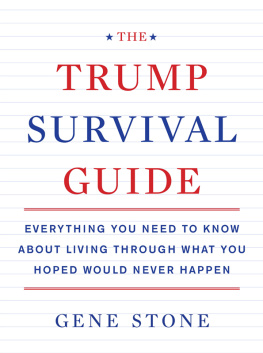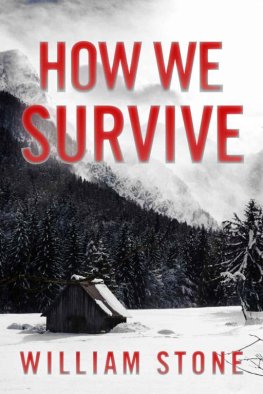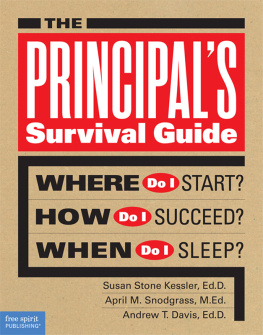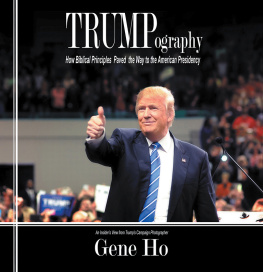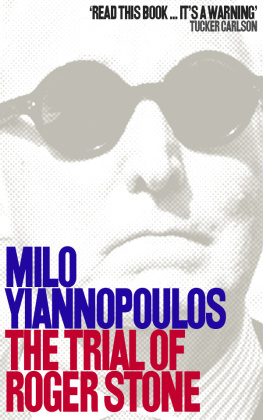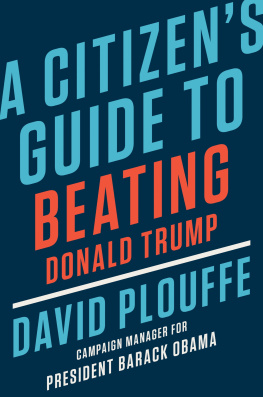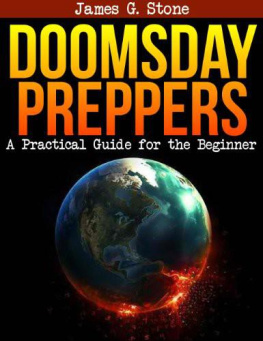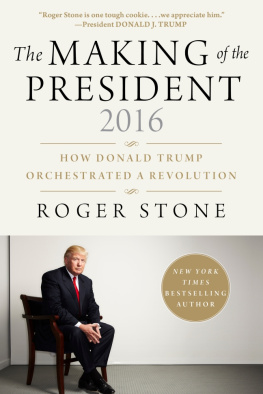O n November 8, 2016, Donald J. Trump was elected president. Most of this books readers probably didnt vote for him. In fact, for a great many Americans, his election was an unthinkable, unimaginable event. That doesnt matter now. It happened. Now all anyone can do is wait and see what kind of president Donald John Trump will become. On the hopeful side, he has not put forth a clear and consistent ideology, and some say this means he is simply the ultimate pragmatist. On the other side of the ledger, his pre-inauguration appointments do not signal pragmatism, and are giving many people cause for extreme concern. But as a FiveThirtyEight headline read after the election, WE VE NEVER KNOWN LESS ABOUT AN INCOMING PRESIDENT S IDEOLOGY .
By itself, serving as president doesnt assure one historical greatness or even importance. And mouthing off in an unpleasant way doesnt necessarily do a nation serious long-term harm. Many American presidents have been deemed to have been failures or nonstarters. One of the most forgettable was John Tyler, the tenth president of the United States. He became president only because the ninth president, William Henry Harrison, died of the pneumonia he is said to have caught at his inauguration, thus giving Vice President Tyler the top job (and the nickname His Accidency). Tyler vetoed key points of his own Whig partys program, leading to the resignation of all but one member of his cabinet; was almost impeached; and was eventually discarded by the Whigs at the next election cycle. Teddy Roosevelt summed up his legacy this way: Tyler has been called a mediocre man, but this is unwarranted flattery.
James Buchanan, the fifteenth president, was either equally ignorable (the defenders view) or downright destructive (the detractors view). He insisted that Congress had no power to stop the spread of slavery into the territories, and watched helplessly as the nation began to split apart. Now consider Warren G. Harding, who appointed dozens of corrupt officials to powerful positions, prompting perhaps the second-biggest scandal in White House history, the Teapot Dome bribery affair. And of course theres Richard M. Nixon, the instigator of the biggest scandal: the Watergate break-in and its cover-up. Nixon was the only president to be driven ignominiously from the White House in the midst of his term, resigning in 1974.
At the moment, historians arent looking terribly kindly at George W. Bush either, since he may have committed the most serious foreign policy error in our nations history: the second Gulf War.
Other presidents, having taken office surrounded by doubts, stepped up to the role. Abraham Lincoln was well respected, but little in his previous career suggested he would become the greatest president in our nations history. Dwight Eisenhowerlike Trumpcame into the office without having ever having held a political office, but he earned a place on many historians top-ten lists. Harry Truman is a classic growth story. He inherited the presidency upon Franklin D. Roosevelts death and wasnt even expected to keep the job at the next election. He not only won, but is also widely deemed to have been an excellent commander in chief.
Presidents are best judged by history, decades after their administrations conclude. Thus its difficult, and perhaps unfair, to judge Trump before his even begins. We dont know what hes going to do. His backstory is so murky and his disclosures so scanty that we dont even know much about what hes already done.
However, judging from his most extreme outbursts and his choice of inner circle, there are plenty of horrific possibilities. He could, for example, transfer power over all federal lands to the states, where their protection from development and environmental harm would become minimal. He could back out of all of the international climate change agreementswhich would stun the rest of the participating nations. He could undo nearly a century of progress by appointing conservative justices, both to lower courts and to the Supreme Court, tilting the laws of the land rightward for decades to come. He could dismantle what little regulatory protection we currently have from the Wall Street excesses that caused the Great Recession. He could force us into some (doomed) armed foreign conflict, perhaps this time with Iran. He could roll back universality of health coverage, the proudest contribution of the outgoing president. And he could undo, even without legislation, many other aspects of the Obama legacy.
We dont know yet which, if any, of these paths Trump will take. If he turns out to be a moderate pragmatist, or his loud bark turns out to be worse than his cutting bite, then we will all have been worrying (or panicking) for naught. In that case, we will remember him as just another politician who didnt live up to either his campaign promises or our worst fears. Thats the good case.
This book, however, is about how to deal with the bad case. If Trump and his team attempt to do grievous harm to the country, then it will be our duty to oppose him vigorouslyin any legal, intelligent, thoughtful, practical way we can. It will do little good to continue the mutual demonizing and personalization that characterized this appalling recent campaign. Instead, we need to be disciplined and try to confine our attention to his actions.
We are not powerless. Keep in mind that although Trump was elected, he won with the support of barely one-quarter of possible eligible voters. And he lost the popular vote. So if he does propose the policies we fear, everyone who voted against him and everyone who should have voted against him can join together, forming a healthy majority that can fight to stop his proposals. (A note to those who didnt vote: If you feel badly, the future offers you redemption. Make things right by joining the fight against destructive actions. That can be just as valuable as the vote you never cast.)
This book will give you the resources to do just that. Here you will find the background for twelve of the major issues facing the American public today: civil rights, the economy, education, energy, entitlement programs, the environment, immigration, LGBTQ issues, national security, Obamacare, political issues, and womens issues. Unless you remember your high school American history classes, most of this information has probably disappeared from your brains memory banks. Consider this a refresher.
The book will also inform you as to President Obamas actions on these issues, and provide you with a preview of what Trump may (or may not) do. Most important, you will see suggestions to help you when (not if) you decide to become an active participant in our democracy by fighting firmly and proudly for your rights, your beliefs, and your country.
A well-educated black has a tremendous advantage over a well-educated white in terms of the job market....If I was starting off today, I would love to be a well-educated black, because I really do believe they have the actual advantage today.
Donald Trump


